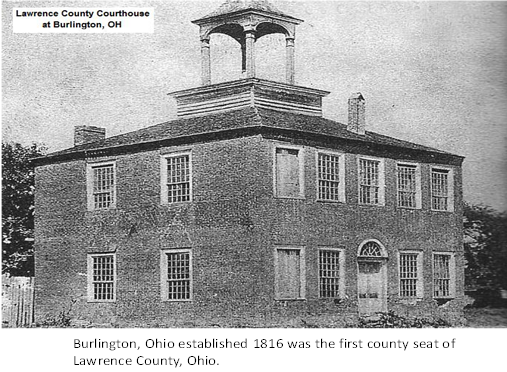
With the downfall of the Academy, which occurred about the time of the removal of the county seat to Ironton in 1851, the Commissioners donated the old Courthouse to the Trustees of the Burlington Academy.
OLD TIMES
SOME HISTORY OF THE BURLINGTON ACADEMY
No. 6.
Ironton Register, Thursday, August 15, 1895
This institution was founded in the Spring of 1842 by the joint contributions of the citizens of Lawrence county, assisted by the liberality of some few citizens of adjoining counties.
The main objectives contemplated by its founders were to educate teachers for the common and other schools, to fit students for college, and furnish the means of a thorough English practical education.
Since the institution was in operation from September 1842 to November 1850, there were 388 pupils. The first Superintendent or Principal was Rev. G. C. Beaman, who taught for three years. He was a thorough educator and was very popular with his pupils. The following were some of those who went to him:
MALES FEMALES
David Nixon Jane Nixon
Jno. Young Viola Reckard
Marion Young Amelia Crumlish
Augustus Young Urania Wheeler
Geo. L. Kouns Emily Wilson
Jno. Kouns Sarah Poague
W. J. Scovell Sarah Johnson
Frank Wheeler Mary Johnson
James Wheeler Phoebe Greene
E. F. Gillen Lydia Greene
I. F. Gillen Mary Kelly
E. M. Frampton Laura Boynton
Martin Frampton Alice Henshaw
C. W. McCoy Romaine Myers
John Bryan Sarah Scovell
W. H. Bryan Eliza Frampton
Joseph Davidson Violetta Reckard
Samuel Crawford Elizabeth Pritchard
Stephen Proctor Emiline Pritchard
Marion Reckard Kate Kouns
The above names I got from the Hon. C. W. McCoy and wife, to whom I am indebted for very much of the history of the Burlington Academy. Both of them were scholars at Mr. Beaman’s school. They speak as eyewitnesses, are well acquainted with all those mentioned above, and praise Beaman as an efficient teacher.
Mr. Beaman was also pastor of the Presbyterian Church, in which building the school was located. Mr. McCoy says there were about 60 scholars in attendance when he was there, and they were from all parts of the county; also from Scioto Co. and from Va., now W. Va.; and some from Ky.
The school was well patronized and turned out both men and women who have made their mark in the world. Quite a number of those enrolled above have passed away, but they have done well in life, and I hope they are on the better shore awaiting their schoolmates’ coming.
After Beaman came John Giles, a graduate of Dartmouth College, N. H., assisted by his highly accomplished wife, who taught at the Academy for almost two years but moved away unexpectedly in March 1847, causing a suspension of the school until the fall term.
No reason is given to the Trustees or by C. Hall, President, who informs the public through the columns of the Lawrence County Gazette of the departure. He says the trustees were not informed of the intended removal till the day before the Spring term should have commenced.
Rev. John Rowe was the next principal of the Academy. He commenced on September 14, 1847, and taught for quite a long time. He was also Surveyor and did much of that kind of business. I have a plat and description of a piece of land I owned [1], which Rev. Rowe did. I can remember him. The amount charged for tuition at the Academy per term of eleven weeks was, for lower branches of English, $4.00. For higher branches of English, $4.50; for the classics, it is $5.00.
After Rowe came to Mr. Menager from Gallipolis, who taught, I think, for two years, I went to him for one year. He was tall, over 6 feet high, and well-educated, but he had no government in his school, and the boys did as they pleased. It was the last term when I went, and at the expiration of it, Menager went back to Gallipolis, and the Burlington Academy became one of the things that were.
At one time, it had 90 pupils enrolled, and they, in connection with the town’s citizens, had a splendid Lyceum[2], which met once a week, and from the notices given in the town paper, the Lawrence County Gazette, it was a success. They also had an exhibition once a year during examination week.
I remember one in which E. F. Gillen, of Proctorville, O., was one of the chief actors. The play was taken from the “Lady of the Lake” by Sir Walter Scott and was the part where Roderick Dhu was the guide for Fitz James; and when on a signal given by Roderick, his men arose on all sides, surrounding James, who, placing himself with his back against a rock and drawing his sword says:
“Come one, come
all this rock shall fly
From its firm
base as soon as I.”
They had what scenery they could make themselves and did well. A comedy followed, but I cannot remember what it was about as I was only ten. With the downfall of the Academy, which occurred about the time of the removal of the county seat to Ironton in 1852, the Commissioners donated the old Courthouse to the Trustees of the Burlington Academy.
The benches, desks, &c. were removed from the old church and placed in the courthouse, which was used as a public school. Having changed the law and other schools springing up, it was not thought profitable to carry on the Academy any longer. Most directors were dead, and no meeting had been held for many years. The scholars of the Academy have been scattered all over the United States: some went to California, others to different states, but if these lines should meet their eyes, they will, I hope, call up memories of the good old school days in Burlington. G.
[1] John G. Wilson.
[2] Lyceum: a hall for public lectures or discussions.

0 Comments